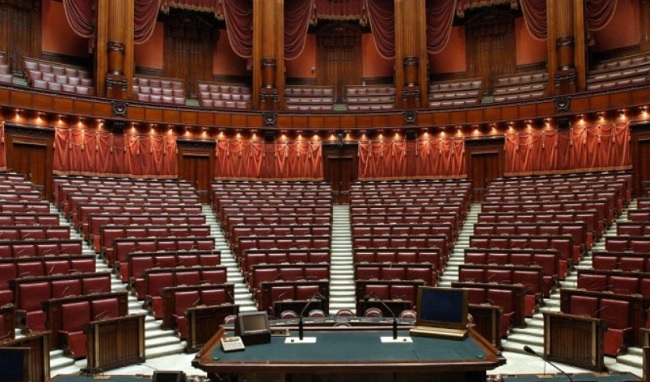Commentary
The debate is damaging Italian democracy more than the referendum’s objective
In the fog of verbiage and useless and irrelevant legislative output, the constitutional referendum to reduce the number of parliamentarians is right at home.

The Italian constitutional referendum isn’t something that stirs up passions. This is equally true for both sides. There’s no point denying it: this issue is adrift on a sea of bored indifference. The demagogic impulse of the “yes” side has been gradually exhausted, together with the avenging fury of its promoters.
Meanwhile, the democratic alarm of the “no” side is unable to get anyone truly concerned, and there is nobody who would seriously claim that the current state of political representation is healthy. Such a situation was not hard to predict.
For those in the field of the so-called “anti-politics” and the resentment that stokes it on a daily basis, no measure against the presumed or real privileges of the political class would be sufficient to satisfy them anyway. Not to mention those extreme fringes who dream of the salvific intervention of the “strongman”—the same ones who usually blame the evils done by past dictatorships on the palace intriguers and bad advisors who allegedly led the great leader into error.
For most of those on that part of the spectrum, however, grumbling and invective are an existential condition, the externalization of one’s own troubles and the main explanation of their origin. Indeed, how can those who constantly complain about misfortune ever escape it (much like the four inebriated retirees in Fabrizio De André’s song “La Città Vecchia”)?
And finally, everyone understands that the reduction in the number of parliamentarians will not benefit them in any way. One can do entirely without the window-dressing, after all.
Thus, the same firebrands who used to be able to rile up the crowds against the “political caste” (actually a struggle between mercenary forces that they themselves were preparing to enter) are falling back on nitpicking arguments devoid of any appeal. Everything else is boredom.
On the other side, that of the defenders of democracy as a complex system, distrust and disillusionment are certainly not rare phenomena either. Even those most attached to the value of parliamentary representation cannot hide from the fact that it has been gutted over the decades by decisions and reforms guided by the North Star of “governability.”
Or, indeed, gutted due to the overwhelming power of the executive (and sometimes of the judiciary) and the desire to protect those in power from pushback coming from the governed. This took place with the complicity of all political forces, and that of the Parliament itself, which is today lamenting that it might lose some more “weight.” In the face of all this, those who take the Constitution like Islamic fundamentalists take the Koran—that is, as the text that contains all political truths, all explanations, instruments and remedies—are certainly not helpful. If anything, they’re the opposite.
Those who during these years have been living their commitment in the social realm, fighting against exploitation and inequalities, who understand politics as a continuous deepening of democracy and not as a static preservation of its forms, as the production of a new institutionality from below, of institutions to manage the commons, are understandably reluctant to take a side in this referendum contest. They embody types of subjectivity that practice and seek to build an autonomous response to the crisis of representation, whose political roots they are carefully focusing on. Everything else is, again, nothing but boredom.
This reform, pushed by the Five Stars in a completely different context and phase of their history, is certainly among the most vapid initiatives, whose symbolic value has a very limited shelf life. However, in this country, there has been an endless number of vapid reforms (when not downright harmful and pernicious, giving rise to resistance and struggle, like those of the school system). And in this fog of verbiage and useless and irrelevant legislative output, the reduction in the number of parliamentarians is right at home.
That is why the alarm raised about its ability to undermine democracy in our country is not taken too seriously either. So much so that the content of the reform is now an increasingly irrelevant backdrop to much more pressing questions of political balances and relations of power, as well as the clashes that will determine them.
It’s very difficult to miss the fact that this obvious situation is eating away at, and further damaging, the image and quality of politics, much more than the specific object of the referendum ever could. We are light years away from the referendums on divorce and nuclear energy, but also from the less remote referendum on public water—back when the stakes were so high that they had a clear impact on the lives of citizens.
That being said, there have been very many reasonable arguments put forward by the supporters of “no.” However, these can largely be traced back to a sort of political orthopedics that tries to put casts on all the fractures of representative democracy, without really concerning itself about how to treat its osteoporosis. That is, without a vision towards a radical renewal of democratic politics, after the failure of the Five Star brand of digital political engineering.
This political orthopedics is not something that can arouse significant passions outside the circle of the specialists in political and institutional matters. What is certain is that more important than the result of this tired public consultation is the very fact that it reveals some things about the political state of the nation. And one can’t find anything good or interesting there.
Originally published at https://ilmanifesto.it/le-speculari-debolezze-nei-protagonisti-del-no-e-del-si/ on 2020-09-04
